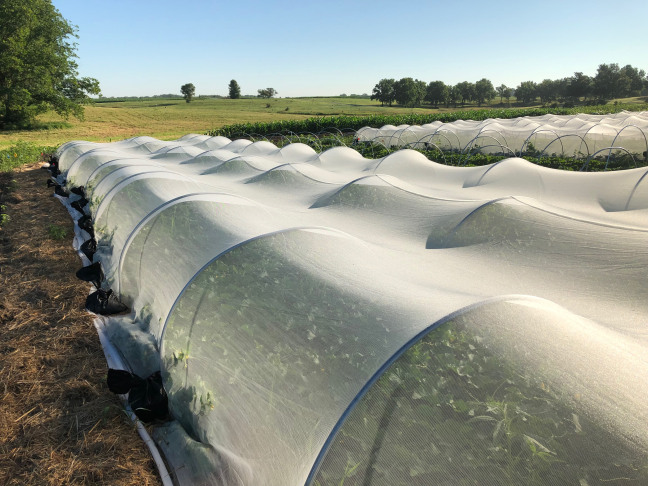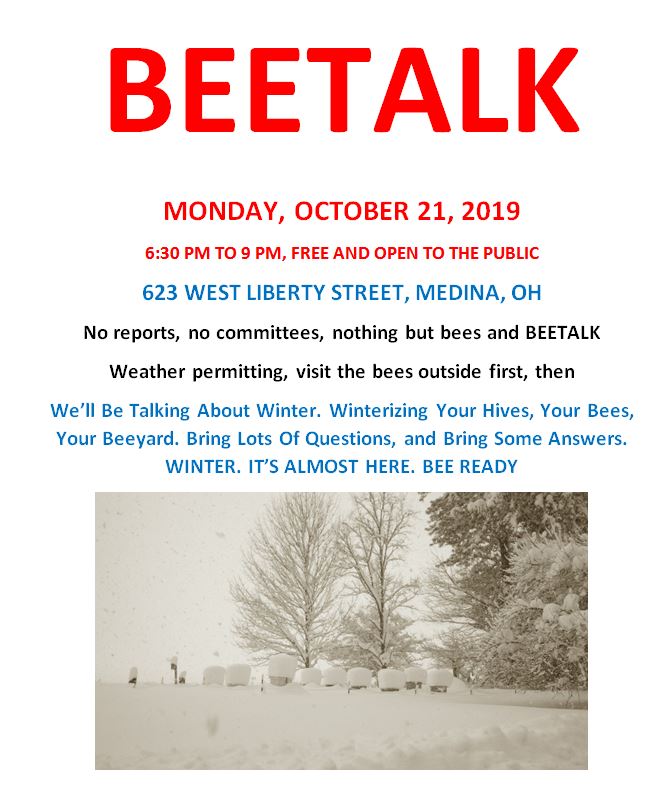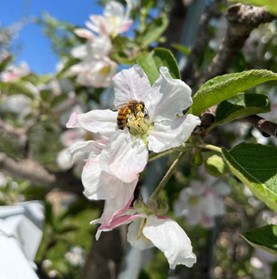Mesotunnels, like those pictured here, are composed of nylon mesh fabric suspended on hoops placed about 42 inches over the ground. The management technique prevents harmful insects from attacking crops. Photo courtesy of Mark Gleason.
AMES, Iowa – Fruit and vegetable growers who adopt organic agriculture practices forgo some of the commonly used tools conventional farmers use to fight pests and disease, but Iowa State University researchers are experimenting with new methods that could give organic growers new options.
The researchers received a $2 million grant from the U.S. Department of Agriculture’s National Institute of Food and Agriculture to test two promising organic methods to help cucurbits, a group of plants that includes melons, squash and cucumbers, fight insects that carry bacterial diseases. The researchers will team with scientists at Cornell University and the University of Kentucky to examine physical barriers that protect plants from unwanted insects and biocontrol measures.
“Organic growers run into a lot of pests and diseases that are difficult to manage with organic tools,” said Mark Gleason, an ISU professor of plant pathology and microbiology and member of the research team. “Our goal is to identify some innovative ways of addressing these problems that also improve sustainability.”
Much of the research will focus on cucumber beetles, squash bugs and other insect pests that target cucurbits and often carry bacteria that cause disease. Gleason said cucumber beetles and squash bugs can devastate organic crops. Growers can use organic pesticides, but those that are available aren’t as effective as conventional pesticides.
Testing new tunnel strategy
Gleason and his research team will study the effectiveness of mesotunnels, or physical barriers composed of nylon mesh fabric that is suspended on hoops placed about 42 inches over the ground, to prevent harmful insects from attacking the crops. Each mesotunnel will cover three rows, and each row in the experiments will extend for 200 feet.
The mesotunnels are similar to a management tool known as low tunnels, which are physical barriers set up about 18 inches above the crops. Low tunnels, however, don’t allow helpful insects to pollinate the plants, a necessary step in crop production, so the screens must be removed when the plants start to flower in order to allow for pollination.
“Cucurbit crops need bees to pollinate them, so with low tunnels you have to take off the row covers to let the bees come in,” Gleason said. “You can have protection for a few weeks, but then the plants get hammered when the cover is removed.”
The new strategy – mesotunnels – can stay in place and protect crops for the whole growing season, he said. The mesotunnels in the experiments will be equipped with boxes of bumblebees to ensure pollination, Gleason said. The mesotunnels have performed well in Iowa on a smaller scale, and the new grant will allow the researchers to test the method on a scale approaching that of commercial growers.
The researchers also will test several weed-control strategies in conjunction with the mesotunnels, Gleason said. Those methods include laying down crop debris and seeding “living mulch,” or plant species such as clover and rye.
The grant also calls for the researchers to evaluate potential biocontrol methods that could help organic farmers combat disease. These biocontrol methods would require producers to introduce biological agents, such as bacteria and viruses, that suppress bacterial diseases in their crops. The researchers will look at bacteria and fungi that induce disease resistance in cucurbits, as well as viruses that attack the bacteria that cause disease.
“It’s ambitious, but it fits well in organic agriculture,” Gleason said. “These biocontrol organisms are environmentally benign and may combine well with other disease-fighting tactics such as mesotunnels.”
______________________________________________________________________________________________________________________________________










